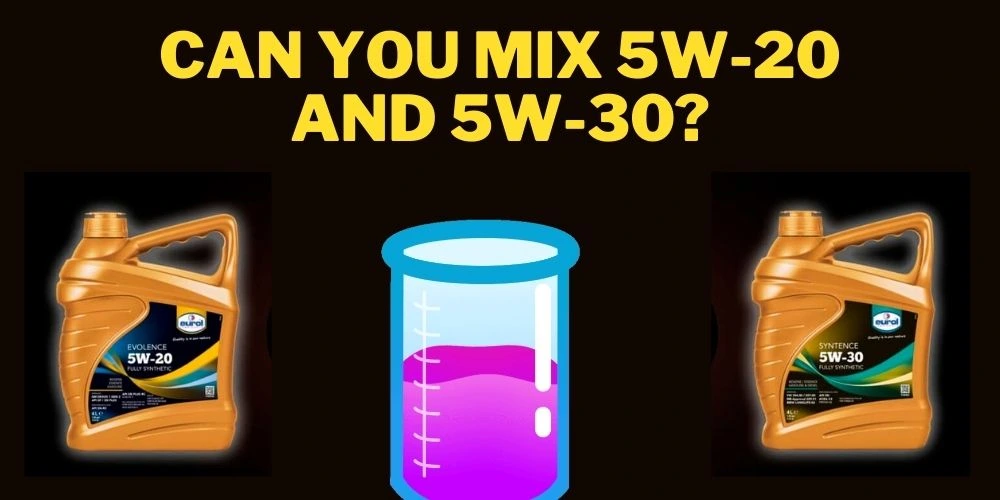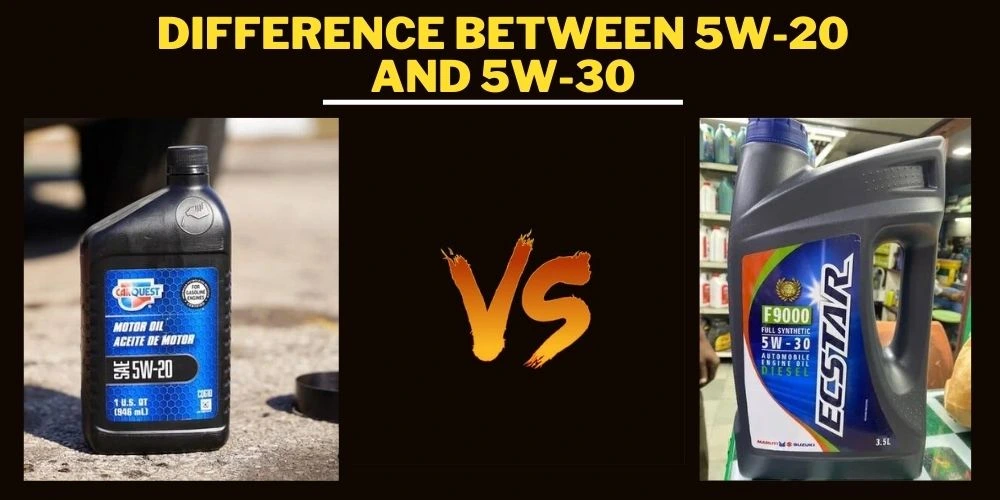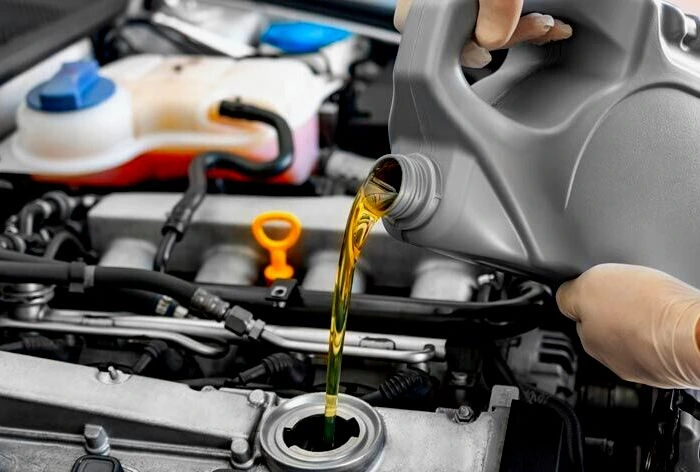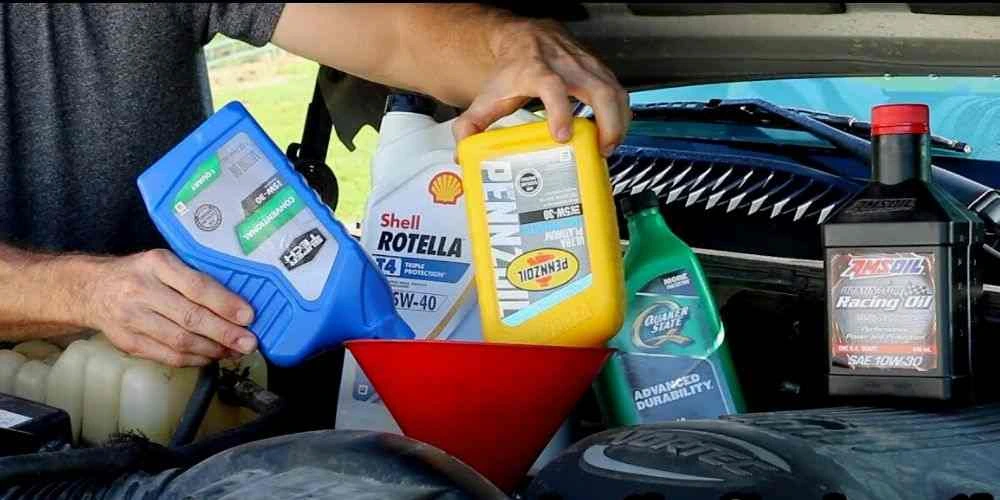If you want to improve the mileage of your car without spending extra, mixing oils is the only way to achieve it. Moreover, if you have ever heard about mixing motor oils, then there must be a question in your mind.
The question is, can you mix 5w-20 and 5w-30?
Well, technically yes, you can mix 5w-20 and 5w30 without causing any harm to the engine. It is ideal because both the motor oils are of the same brand and share a similar API level service.
But, the dilemma is very real about whether to mix 5w-20 with 5w-30 and if it is ideal.

Finding the right oil for your engine is not always easy, and at times the only option left is mixing. So, don’t panic while mixing the oils if they satisfy the required criteria in such situations.
Although mixing motor oils is not recommended, doing it once will certainly not affect the performance of your car.
Contents
Can you mix two types of motor oils of different viscosities and components?
Yes, you can mix two types of motor oils of different viscosities and components. However, before mixing, you need to understand both the oils. When oils of different viscosities and components are mixed, they are never entirely soluble; hence, single oil is not formed.
Well, when used for emergency purposes, this blend does not affect the engine. But if the oils are mixed in an incompatible engine, it may lead to several damages. All these damages like overheating, oil leak, sludge formation and deposits in the engine are not caused overnight and are the results of long-term oil mixing.
Therefore, it is always recommended to flush out the incompatible oil before refilling your engine with the right one.
Difference between 5w-20 and 5w-30
Despite being of the brand, 5w-20 and 5w-30 motor oils are very different.
5w-20 is thin engine oil that operates perfectly at low temperatures and is unsuitable for higher temperatures. On the other hand, 5w-30 functions fluently in both temperatures.
This motor oil is mostly suited to higher temperatures and is thicker and more dense than 5w-20.
To talk about economic importance, 5w-20 is often preferred over 5w-30. This is because while using 5w-20, less oil is used to provide a thin barrier around the engine’s components. Although not much can be guessed initially, it adds gradually and saves oil in the long run.

The main purpose of 5w-20 is to coat all the engine parts and avoid any oil starvation. In addition, it also lowers resistance among the components while moving against each other. 5w-20 even coats the finest and deepest parts of the engine without leading to oil deprivation.
Contrastingly, the functions of 5w-30 are completely dissimilar. It serves to lubricate the engine during higher temperatures.
When used for operating at low temperatures, the penetrating power of 5w-30 gets affected greatly and leads to oil deprivation. Similarly, when 5w-20 is used at higher temperatures, it causes premature wear and tears due to the thin covering.
Can you mix 5w-20 and 5w-30?
Yes, you can easily mix 5w-20 with 5w-30 and vice versa. Although it won’t hurt your engine, mixing them is not always good as 5w-30 is heavier than 5w-20.
According to automobile experts, it is often better to mix oils instead of using one of the same weight. This is because it makes your engine adaptable to various viscosities. Well, engine oils of different viscosities have different lubricating and cleaning abilities. This is certainly good for your engine to stay clean and problem-free.
Moreover, it also prevents the engine from thinning, which might be caused due to the use of thin oil for too long.
However, if you dream of enhancing your vehicle’s performance and mileage, you will be disappointed.
Things to consider when mixing 5w-20 and 5w-30 oil
Not all types of motor oils can be mixed and made into a perfect blend. Several factors must be considered when topping off 5w-20 with 5w-30 for maximum benefits.

Brand
Two oils of different brands should never be mixed. This is because every brand is formulated differently regarding additives, and its concentration is impossible to guess. Different brands should not be blended even if the oils have the same viscosity.
American Petroleum Institute level (API)
You should always mix motor oils of the same API level to prevent the formation of explosive blends. Nowadays, most modern engine oils have the same API standards SN and can be mixed easily. Be it synthetic, semi-synthetic or mineral oil, each with a similar API level service can top off with another.
What ratios can you mix?
The ratio of mixing depends upon the type of engine you are using. If operating a 5w-20 engine, you should mix a larger proportion of the lighter oil with a smaller proportion of the heavier one.
For example: Your car is fitted with a 5w-20 engine. In this case, you will mix 2 parts of 5w-20 oil and 1 part of 5w-30 oil.
Will mixing oil hurt your car?
Although mechanics discourage the concept of mixing motor oils, it won’t cause any harm to your car. Besides, using oil blends once in a while does not even affect the performance of your car. However, if used for too long, your car might show signs of damage.

Most synthetic and semi-synthetic engine oils are based on regular oils, so their blends are compatible with short use.
Frequently Asked Questions (FAQs)
Is 5w-20 good for winter?
Yes, 5w-20 is very good for winter. It is another low-temperature grade oil that is ideal for use in wintertime. The best engine oil for people living in colder areas, 5w-20 is mostly used for light-duty applications.
It prevents the engine from touching extreme temperatures and assures excellent start-up performance.
Can you use 5w-20 instead of 5w-30?
No, using 5w-20 instead of 5w-30 is not a good choice. This is because 5w-20 is less dense than 5w-30, so it isn’t the best fit for the same.
Moreover, a 5w-30 engine must be lubricated properly during high temperatures, which won’t be done if lighter oil is used. At high temperatures, 5w-20 cannot even coat the components properly and separate the engine part due to its thin barrier. Hence, it ends up causing premature wear and tear.
Conclusion
Except for emergencies, mixing multi-grade engine oil is not a good practice. Moreover, the fact that they don’t offer any specific benefit to your vehicle makes it an undesirable technique these days.
While mixing oils isn’t that harmful for short use, it may cause loads of damage to your engine if incompatible.


